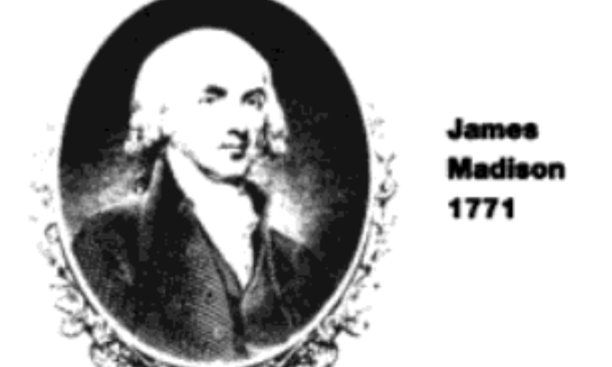
David Williamson, formerly PAW’s staff writer, neither lived in Wilson College nor graduated from the Wilson School.
James Madison 1771 has gotten a raw deal from his alma mater. Indeed, Princeton’s treatment of the Father of the Constitution seems downright criminal when compared to the glorification accorded to the other alumnus who became President of the United States, the overrated and uptight Woodrow Wilson 1879. It’s high time the university rehabilitated Madison and purged Wilson.
Heresy, you say? Discard your orange-and-black blinders for a moment, and take a long, hard look at the accomplishments of these two famous Americans. On the one hand, we have Madison. He was instrumental in framing the Constitution and getting it ratified. (Remember the Tenth Federalist?) He was a member of the Continental Congress and the U.S. Congress, was Thomas Jefferson’s secretary of state, served two terms as President, and, late in life, served as the first president of Princeton’s alumni association. Granted, the War of 1812 was a bit of a bore, but it’s about the only blot on Madison’s copybook.
Now let’s look at Wilson. At Princeton, he was outmaneuvered by Andrew Fleming West 1874, the first dean of the Graduate School, on the location and size of the Graduate College, and his anti-club “Quad Plan” for undergraduates was squashed by alumni. He served only two years as governor of New Jersey before he was elected President. To be sure, his public career was marked by the enactment of a number of progressive measures, but he lost the most important fight of all when the Senate rejected the Versailles Treaty. By all accounts, Wilson was stubborn, inflexible, and uncompromising.
And yet consider the ways in which Princeton has honored its pair of presidents. As you can see, the ledger is clearly balanced in favor of Wilson.
Wilsoniana: Woodrow Wilson Lodge (later the Wilson Society and now Wilson College, which includes the Wilson Theatre); the Woodrow Wilson School of Public and International Affairs; Woodrow Wilson Hall (renamed Corwin Hall after Minoru Yamasaki built the Shinto-Grecian Gothic edifice now called Robertson Hall to house the Wilson School); Woodrow Wilson Plaza (facing the aforesaid building); and the Woodrow Wilson Award (the university’s highest honor for an undergraduate alumnus). A full-length portrait of Wilson hangs in the Faculty Room of Nassau Hall, and a sculpted bust sits in the lobby of the Wilson School.
Madisoniana: James Madison Hall (previously part of the complex known as Commons, now the student lounge of Rockefeller College); the James Madison Society (a defunct university-sponsored alternative to the clubs); the James Madison Medal (the university’s highest honor for an alumnus of the Graduate School, created ten years after the Wilson Award); the James Madison Preceptor (one of ten Bicentennial Preceptorships)/ and the James Madison Professor of Political Economy (who, naturally, teaches in the Wilson School). There’s a small but nice portrait of Madison in Maclean House, although few people have seen it.
What’s most remarkable about this comparison is that Madison’s influence seems to have waned as Wilson’s has waxed. Every day, Wilson’s name is heard on the campus: students live in Wilson College, or study at the Wilson School, or frolic in the Wilson Plaza fountain. Meanwhile, Madison has sunk almost completely out of sight. A decade ago, you’d have heard “Madison” more frequently, because Madison Hall was the part of Commons that served hamburgers and hot dogs at lunch every day. (A cruel joke, in my opinion, to play on the Father of the Constitution.) But with the establishment of residential colleges for all underclassmen, both Madison Hall and the Madison Society vanished from the undergraduate lexicon.
Is this some insidious plot? What can possibly account for Princeton’s worship of Wilson and maligning of Madison? Permit me to advance some theories that may account for the disparity.
Football: As a student, Wilson was too small to play on the team, but he served as secretary of the Football Association, raised funds in support of it, and helped coach the players, who competed, he wrote in The Daily Princetonian, with a “gentlemanly spirit.” In the fall of his senior year, the team was undefeated, tallying its most victories in a season (six) to that time. The only sport available to poor Madison was debating on behalf of the American Whig Society.
Rhetoric: Wilson was great on the stump. Probably more alumni recognize “Princeton in the Nation’s Service” than the Fourteen Points. Of course, Wilson’s rhetoric rarely produced the results it promised, like making the world safe for democracy. Similarly, his widely hailed preceptorial method was less a democratizing innovation to improve the education of students than a means of sloughing off the burden of teaching undergraduates onto “preceptor guys” (the original overworked T.A.s). Madison, a more retiring type, took lots of notes instead of making grand orations.
Wordiness: This point flows logically from Wilson’s rhetorical prowess. The Papers of Woodrow Wilson, published by Princeton University Press, has filled sixty-three volumes – and that’s only through 1919. By contrast, The Papers of James Madison, published by the University Press of Virginia, has consumed only about twenty (although the Presidential years are to come). The squeaky wheels gets the grease.
Timing: In 1920, at the end of his Presidency, Wilson was in the public doghouse, on account of his failure to convince the Senate to ratify the Versailles Treaty. Princeton’s Wilson cult didn’t really get started until after the Second World War, when his internationalist policies had been vindicated by history. This vindication coincided with the university’s tremendous postwar expansion, when lots of new things needed names.
Madison was Princeton’s first graduate student: Need I say more?
This was originally published in the January 23, 1991 issue of PAW.
